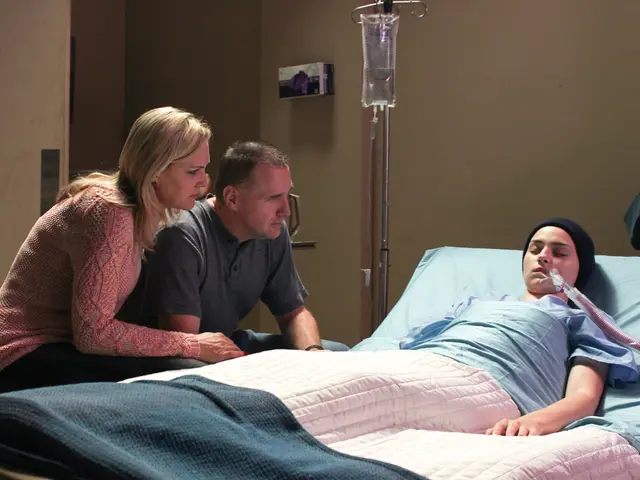Dementia Caregivers' Sleep Deprivation: The Reason Behind It and Coping Strategies
Taking care of someone with dementia isn't a walk in the park, and one of the most challenging aspects is getting some shut-eye. Nighttime restlessness, confusion, and disrupted sleep patterns can keep caregivers wide awake, leading to exhaustion that affects both their mental and physical health. Sleep starvation makes coping more difficult, making simple day-to-day tasks feel insurmountable.
If you're a dementia caregiver dealing with sleep deprivation, remember you're not alone. Chronic sleep issues can crop up due to irregular sleep patterns, frequent waking, and confusion at night. To catch some Zs, you can establish a structured bedtime routine, seek help from respite care, and make your loved one's surroundings cozy and comfy. Ignoring the issue can have dire consequences on your health, so make rest a priority.
What's Sleep Deprivation All About?
Sleep deprivation refers to not getting enough sleep, whether it's for a single night or an extended period. If you're sleep-deprived, your body and mind feel the brunt. Memory, focus, and mood suffer. You may begin to feel irritable, forget things, or struggle to complete tasks. Over the long haul, lack of sleep can lead to severe health problems such as high blood pressure, heart disease, and a weakened immune system.
Why Do Dementia Caregivers Experience Sleep Deprivation?
Dementia messes with a person's brain, making sound slumber elusive. They might wake up disoriented, wander at night, or have sundowning, wherein their symptoms worsen in the evening. As a caregiver, it's your job to stay vigilant, causing potential sleep interruptions. Here are common reasons why many caregivers lose sleep:
- Frequent waking
- Wandering
- Sundowning
- Anxiety and stress
- Physical demands of caregiving
Symptoms of Sleep Deprivation
If you're not getting your beauty sleep, your body's bound to show signs. These include:
- Constant fatigue
- Trouble focusing or remembering things
- Irritability, short temper, or unnecessary frustration
- Dizziness or frequent headaches
- Frequent illness due to a compromised immune system
- Falling asleep during the day unintentionally
Sleep Deprivation Risks for Caregivers
Lacking sleep goes beyond tiresomeness; it can pose real health hazards. Here's what you stand to lose:
Overcoming Sleep Deprivation
If you're struggling to catch some meaningful shut-eye, here's a game plan:
- Establish a Bedtime Routine - Try to sleep at the same time each night and wind down with relaxing activities like reading, listening to calming music, or taking a warm bath.
- Make Your Sleep Space Comfy - Ensure the bedroom is quiet, dimly lit, and cool. Use blackout curtains and white noise machines if needed.
- Handle Nighttime Disruptions - Implement motion detectors or door alarms if your loved one tends to wander at night while allowing you to catch some Zs.
- Get Assistance - Enlist friends, family, or professionals to help care for your loved one so you can catch up on sleep.
- Take Naps - If a full night's rest feels like a pipe dream, take short naps during the day to boost your energy.
- Try Respite Care - Hire a caregiver for a few hours to allow you to recharge while they tend to your loved one.
What's Science Saying?
Research shows that a whopping two-thirds of dementia caregivers face sleep disturbances. These issues stem from disrupted sleep routines, stress, depression, and poor physical health. For instance, a caregiver may wake up multiple times at night to assist a loved one who's restless or confused. Over time, this can lead to exhaustion and even health problems. Healthcare professionals should work to understand these challenges and offer suitable sleep solutions.
When and Who Should You Ask for Help?
If sleep deprivation is taking a toll on your health, it's essential to seek assistance. Here are signs to watch for and resources to turn to:
- When should you seek help?
- When you feel chronically exhausted
- When dealing with anxiety or depression
- When your health is deteriorating due to lack of rest
- When your caregiving patience is flagging
- Who can help?
- Doctor - Address your concerns, and they can suggest solutions.
- Support Groups - Talk with other caregivers to feel less alone.
- Respite Care Services - These offer short-term relief from caregiving duties.
- Friends and Family - Ask loved ones for aid with caregiving tasks, so you can get some much-needed rest.
Dealing with Irritation from Lack of Sleep
When you're sleep-deprived, you might become increasingly irritable, short-tempered, or overwhelmed. Follow these tips to manage:
- Take Deep Breaths - Slow, deep breathing can help calm you when you feel frustrated.
- Take Breaks When Needed - If your loved one is safe, step away for a short break to clear your mind.
- Get Some Fresh Air - Brief outdoors jaunts can revive your mood.
- Open Up to Someone - Share your feelings with a friend or support group.
- Keep Hydrated and Eat Well - Dehydration and poor nutrition can worsen irritation.
- Dementia can disrupt sleep patterns, leading to sleep deprivation for caregivers, causing not only physical exhaustion but also impacting mental health.
- Chronic sleep issues for dementia caregivers can arise from factors such as irregular sleep patterns, frequent waking, and confusion at night.
- Ignoring sleep deprivation can lead to severe health problems such as high blood pressure, heart disease, and a weakened immune system.
- To combat sleep deprivation, establishing a structured bedtime routine, making the sleep environment comfortable, handling nighttime disruptions effectively, seeking assistance through respite care, taking naps, and trying respite care can help dementia caregivers catch some Zs.







